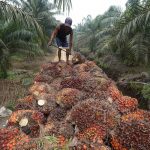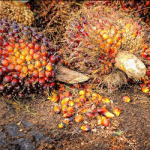
As Nigeria and Ghana have begun to regulate the importation of rice and poultry into their territories, India has also planned to impose fines on the importation of palm oil products.
The country aims to increase local production and reduce dependence on foreign edible oil.
This was made known by the country’s finance minister,Rajesh Malhotra.
Mister Malhotra said discussions are ongoing to add more levies on the already existing ones
India is the world’s largest buyer of palm oil with population of about 1.354 billion people taking a larger chunk of global export, the $30 billion global industry of palm oil shipment may shrink thereby causing a huge distortion in the market.
The country’s total consumption of refined palm oil products annually stands at 25 million tonnes and import at 15 million tonnes.
The government plans to double palm oil farmer’s income to revive the country’s palm oil industry.

As Nigeria and Ghana have begun to regulate the importation of rice and poultry into their territories, India has also planned to impose fines on the importation of palm oil products.
The country aims to increase local production and reduce dependence on foreign edible oil.
This was made known by the country’s finance minister,Rajesh Malhotra.
Mister Malhotra said discussions are ongoing to add more levies on the already existing ones
India is the world’s largest buyer of palm oil with population of about 1.354 billion people taking a larger chunk of global export, the $30 billion global industry of palm oil shipment may shrink thereby causing a huge distortion in the market.
The country’s total consumption of refined palm oil products annually stands at 25 million tonnes and import at 15 million tonnes.
The government plans to double palm oil farmer’s income to revive the country’s palm oil industry.

As Nigeria and Ghana have begun to regulate the importation of rice and poultry into their territories, India has also planned to impose fines on the importation of palm oil products.
The country aims to increase local production and reduce dependence on foreign edible oil.
This was made known by the country’s finance minister,Rajesh Malhotra.
Mister Malhotra said discussions are ongoing to add more levies on the already existing ones
India is the world’s largest buyer of palm oil with population of about 1.354 billion people taking a larger chunk of global export, the $30 billion global industry of palm oil shipment may shrink thereby causing a huge distortion in the market.
The country’s total consumption of refined palm oil products annually stands at 25 million tonnes and import at 15 million tonnes.
The government plans to double palm oil farmer’s income to revive the country’s palm oil industry.

As Nigeria and Ghana have begun to regulate the importation of rice and poultry into their territories, India has also planned to impose fines on the importation of palm oil products.
The country aims to increase local production and reduce dependence on foreign edible oil.
This was made known by the country’s finance minister,Rajesh Malhotra.
Mister Malhotra said discussions are ongoing to add more levies on the already existing ones
India is the world’s largest buyer of palm oil with population of about 1.354 billion people taking a larger chunk of global export, the $30 billion global industry of palm oil shipment may shrink thereby causing a huge distortion in the market.
The country’s total consumption of refined palm oil products annually stands at 25 million tonnes and import at 15 million tonnes.
The government plans to double palm oil farmer’s income to revive the country’s palm oil industry.

As Nigeria and Ghana have begun to regulate the importation of rice and poultry into their territories, India has also planned to impose fines on the importation of palm oil products.
The country aims to increase local production and reduce dependence on foreign edible oil.
This was made known by the country’s finance minister,Rajesh Malhotra.
Mister Malhotra said discussions are ongoing to add more levies on the already existing ones
India is the world’s largest buyer of palm oil with population of about 1.354 billion people taking a larger chunk of global export, the $30 billion global industry of palm oil shipment may shrink thereby causing a huge distortion in the market.
The country’s total consumption of refined palm oil products annually stands at 25 million tonnes and import at 15 million tonnes.
The government plans to double palm oil farmer’s income to revive the country’s palm oil industry.

As Nigeria and Ghana have begun to regulate the importation of rice and poultry into their territories, India has also planned to impose fines on the importation of palm oil products.
The country aims to increase local production and reduce dependence on foreign edible oil.
This was made known by the country’s finance minister,Rajesh Malhotra.
Mister Malhotra said discussions are ongoing to add more levies on the already existing ones
India is the world’s largest buyer of palm oil with population of about 1.354 billion people taking a larger chunk of global export, the $30 billion global industry of palm oil shipment may shrink thereby causing a huge distortion in the market.
The country’s total consumption of refined palm oil products annually stands at 25 million tonnes and import at 15 million tonnes.
The government plans to double palm oil farmer’s income to revive the country’s palm oil industry.

As Nigeria and Ghana have begun to regulate the importation of rice and poultry into their territories, India has also planned to impose fines on the importation of palm oil products.
The country aims to increase local production and reduce dependence on foreign edible oil.
This was made known by the country’s finance minister,Rajesh Malhotra.
Mister Malhotra said discussions are ongoing to add more levies on the already existing ones
India is the world’s largest buyer of palm oil with population of about 1.354 billion people taking a larger chunk of global export, the $30 billion global industry of palm oil shipment may shrink thereby causing a huge distortion in the market.
The country’s total consumption of refined palm oil products annually stands at 25 million tonnes and import at 15 million tonnes.
The government plans to double palm oil farmer’s income to revive the country’s palm oil industry.

As Nigeria and Ghana have begun to regulate the importation of rice and poultry into their territories, India has also planned to impose fines on the importation of palm oil products.
The country aims to increase local production and reduce dependence on foreign edible oil.
This was made known by the country’s finance minister,Rajesh Malhotra.
Mister Malhotra said discussions are ongoing to add more levies on the already existing ones
India is the world’s largest buyer of palm oil with population of about 1.354 billion people taking a larger chunk of global export, the $30 billion global industry of palm oil shipment may shrink thereby causing a huge distortion in the market.
The country’s total consumption of refined palm oil products annually stands at 25 million tonnes and import at 15 million tonnes.
The government plans to double palm oil farmer’s income to revive the country’s palm oil industry.














